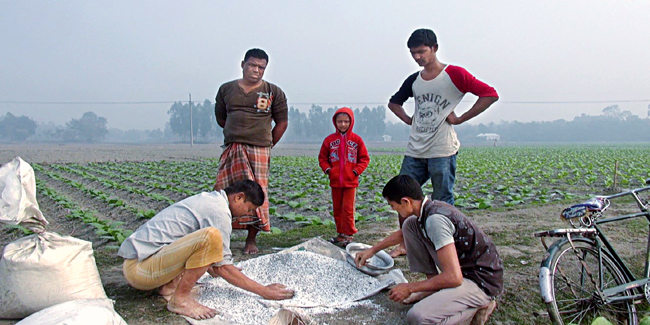

Subsidised fertiliser used in tobacco fields as preventive mechanism absent

A good portion of the government subsidised fertilisers, meant for producing different food crops, is going to the wrong hands -- growers of harmful tobacco in Nilphamari and Lalmonirhat districts.
Our Nilphamari Correspondent reports: The attempts by the government’s health and agriculture departments and different NGOs to discourage tobacco cultivation proves hardly effective as subsidised fertiliser is often purchasable for tobacco farmers.
“Fertilizer traders in local markets welcome tobacco farmers like me as we pay ready cash for it. We can do so as we get interest-free loan from tobacco companies while poor farmers of other crops often buy it on condition of paying the price later,” said Mominul Islam, 45, of Dogachhi village in Sadar upazila.
On the other hand, president of district’s fertilizer association Abdul Wahed Sarker said, “Tobacco farmers often cheat us, saying that they would use the fertilizer for cultivating Boro or other crops. It is not possible to verify the fact, going door to door.”
In the ongoing Rabi season from October to March, the Department of Agricultural Extension (DAE) set a target of cultivation of Boro paddy, maize, potato, wheat and other crops on 1.50 lakh hectares of land, said Aref Rabbani, sub assistant agriculture officer in Nilphamari.
“To meet the requirement of fertilizer for recommended crops, the government allocates 13.5 thousand tonnes of chemical fertilizers like triple super phosphate, di-ammonium phosphate (DAP), murate of potas and nitrogenated urea,” he said.
The government gives up to 50% subsidy for the fertilizers, which is never meant for tobacco farming, said Sirajul Islam, additional deputy director of district DAE.
Shahin Jahangir Alam, managing director of local NGO ‘Camp’ that conducts awareness campaigns regarding tobacco, said, “Tobacco is being cultivated on 3,005 hectares of land in the district this year, which is around 50 acres more than last year’s. Availability of fertilizer is a main reason for cultivation of the harmful crop in such a vast area.”
Sunil Roy, 60, a farmer of Jaldhaka upazila, said he and many others grow tobacco as they incurred repeated loss by cultivating other crops while tobacco price is always satisfactory.
Investigation by this correspondent found that several tobacco companies provide farmers with technical support and interest-free loan for buying fertilizer, insecticide and paying the labourers.
Contacted, DAE Deputy Director in Nilphamari Nikhil Chandra Biswas said, “We motivate tobacco farmers to replace it with useful crops and forbid fertilizer dealers to sell the item to tobacco farmers.”
Our Lalmoirhat Correspondent reports: Government subsidized fertiliser, especially di-ammonium phosphate (DAP), is often used by tobacco farmers in the district.
During the last tobacco farming season, they had to buy the non-urea fertiliser at Tk 25 per kg but they are now buying it at the government fixed rate of Tk 16.
The subsidised rate helps tobacco farmers to save a portion of the cultivation cost as they have to use 100 to 120 kg of DAP for producing the item on a bigha, said farmers.
“The tobacco company concerned give us 10 to 15 kg of DAP fertiliser free of cost for farming the crop on each bigha of land. And we can buy the rest of the requirement, around 100 kg, for low price. I have cultivated tobacco on 12 bighas of lad this season although it was nine bighas in the last season,” said Nazrul Islam, a farmer at Sarpukur village in Aditmari upazila.
“DAP fertilizer is a must to get a good yield of tobacco. Perhaps the government does not know that we are using it in large quantities for tobacco cultivation,” said Shaher Ali, a tobacco farmer in the same village.
The decrease in DAP fertiliser price this year helps companies as well as farmers to save cost of tobacco production, said a representative of a multinational tobacco company at Aditmari upazila, on condition of anonymity.
Abdul Hakim, president of Lalmonirhat District Fertiliser Dealers Association, said, “We sell fertiliser at government fixed rates. It is difficult to understand whether a farmer coming to buy DAP is a tobacco grower.”
Aditmari Upazila Agriculture Officer Ali Noor said they suggest farmers to avoid tobacco cultivation.
Officials of the Department of Agriculture Extension in Lalmonirhat said tobacco has been cultivated on 6,920 hectares of land in the district this year.
Stakeholders, however, said the actual area of its cultivation would be much more.
SourceL The daily Star, 02 feb 2020